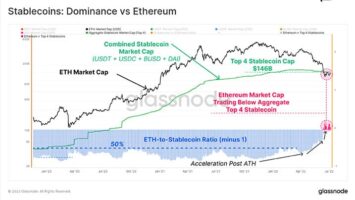SNEAK PEEK
- Elon Musk questions Vitalik Buterin’s departure from X, sparking widespread discussion.
- Autism Capital urges Buterin’s return to X to leverage his influence for Ethereum’s benefit.
- The debate highlights the strategic importance of platform choice in the digital culture war.
In a recent online discourse, the spotlight turned to Ethereum co-founder Vitalik Buterin and his social media preferences, igniting discussions that reached the desk of tech mogul Elon Musk. Amidst the digital chatter, Musk raised a question that echoed the sentiments of many: “Why did Vitalik Buterin leave X?” This inquiry followed a push from Autism Capital, advocating for Buterin’s return to the platform, amidst his noticeable shift to Farcaster—a burgeoning hub for cryptocurrency enthusiasts and a platform praised by Buterin himself for its utility and innovation as a Twitter alternative.
Vitalik needs to get back on X. Farcaster isn’t going to win the culture war. If he wants Ethereum to shine he should engage more on this platform, not sequester himself with his chosen peers on an island. He will have far more impact if he engages the bigger community here.
— Autism Capital 🧩 (@AutismCapital) March 25, 2024
Farcaster, gaining traction within the crypto community, has been lauded by Buterin for its unique channels that, in his view, surpass Twitter in several aspects. Despite his endorsement, Autism Capital’s plea highlights a broader concern: the battle for cultural dominance online and the strategic importance of platforms with massive followings. With Buterin’s follower count on X towering at 5.2 million, compared to his 180,000 on Farcaster, the call for his return underscores a strategy to leverage his substantial influence to further elevate Ethereum’s visibility and engagement within the larger digital community.
The conversation, sparked by Musk’s simple yet profound question, reflects the ongoing debate about the role of social media in shaping the narrative and adoption of technologies like Ethereum. Moreover, it points to the evolving landscape of online communities, where platforms like Farcaster emerge as contenders, challenging established giants by offering specialized spaces for niche audiences.
This unfolding story brings to the forefront the dynamics of online influence, the strategic choices of tech leaders in engaging with their audiences, and the continuous evolution of digital platforms. As the dialogue continues, it remains to be seen how these interactions will influence the visibility and adoption of technologies like Ethereum, and whether voices like Buterin’s will shift the tides in the so-called culture wars of the digital age.
The exchange between Musk and the crypto community not only highlights Buterin’s strategic online presence but also underscores the shifting sands of digital engagement and influence. As platforms vie for the attention of influential figures like Buterin, the crypto world watches closely, recognizing the power of social media in shaping the future of technology.









